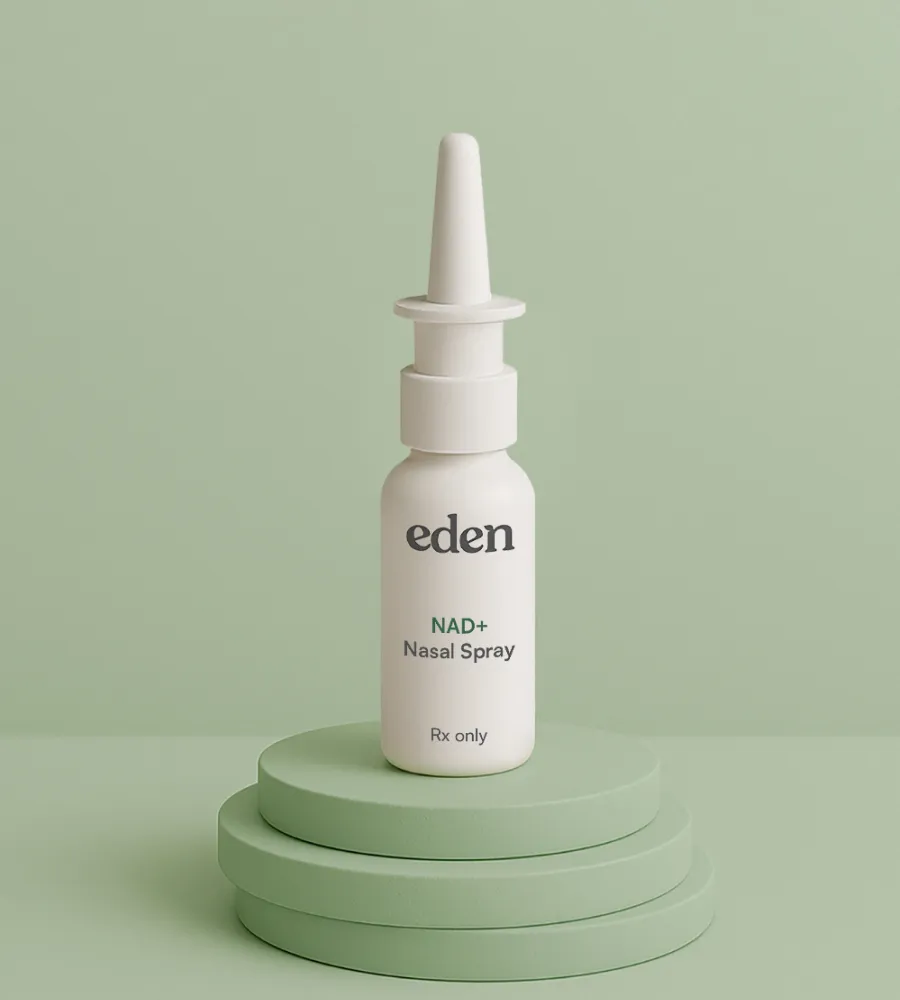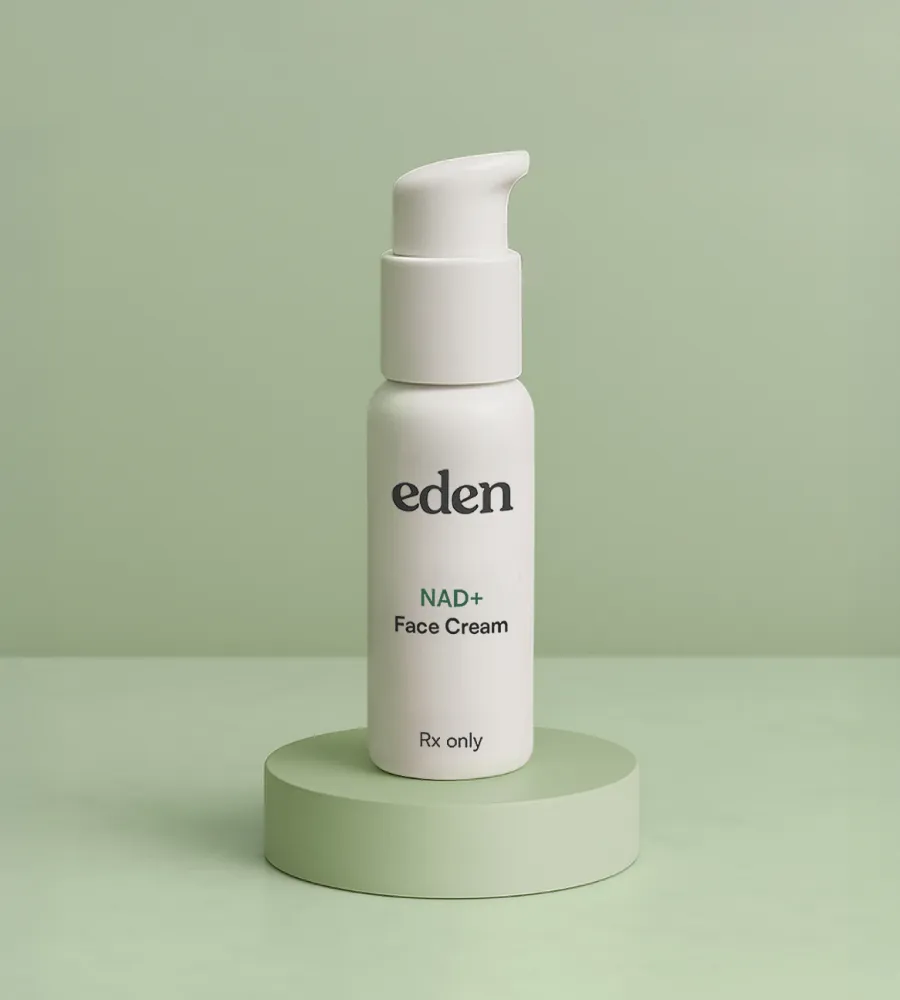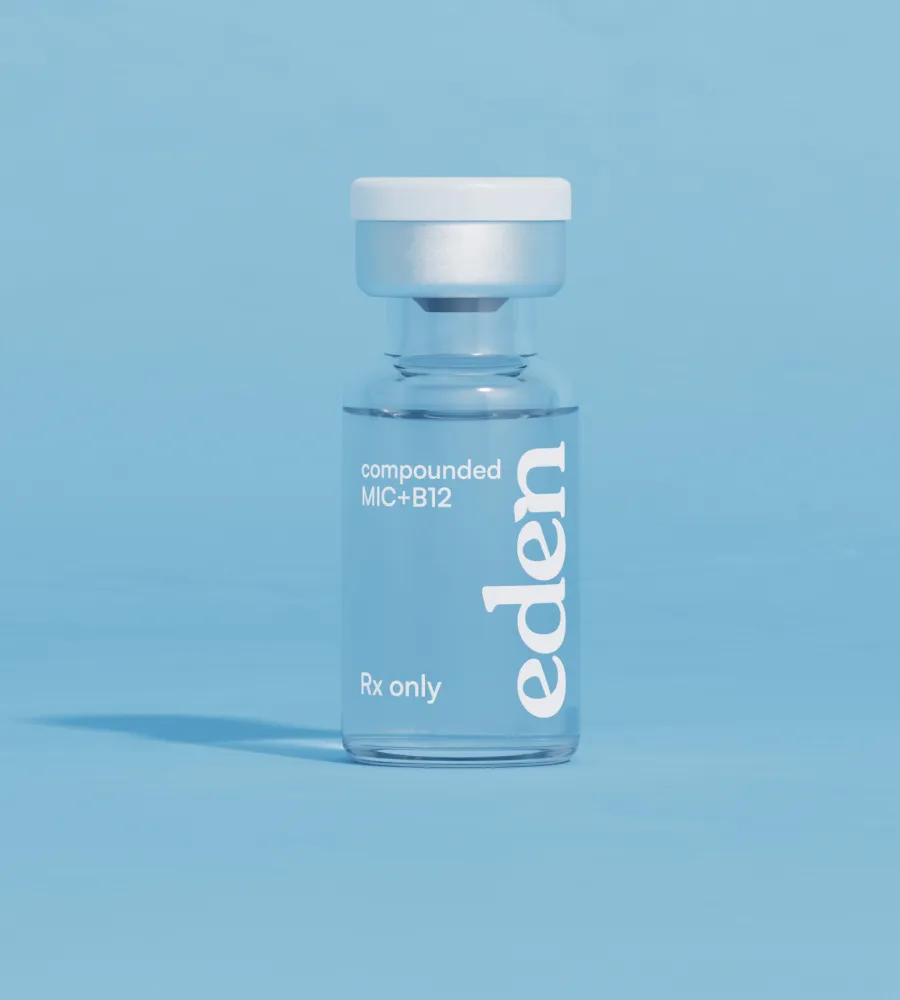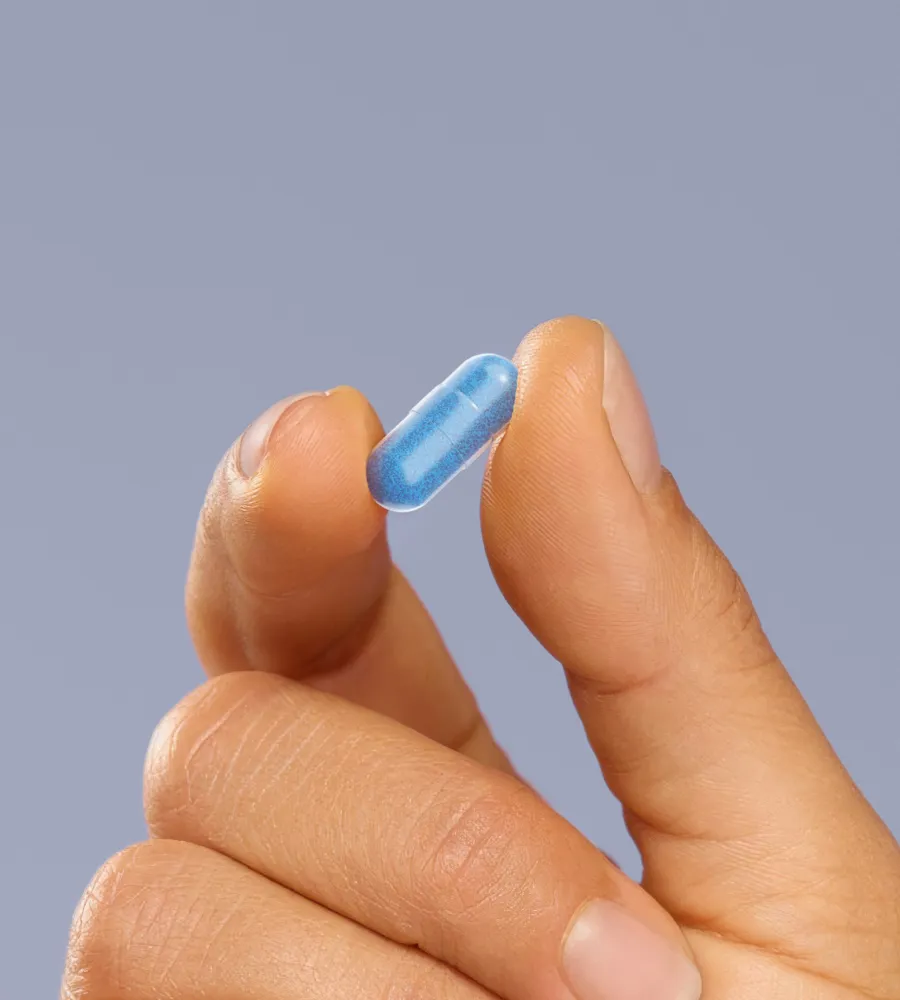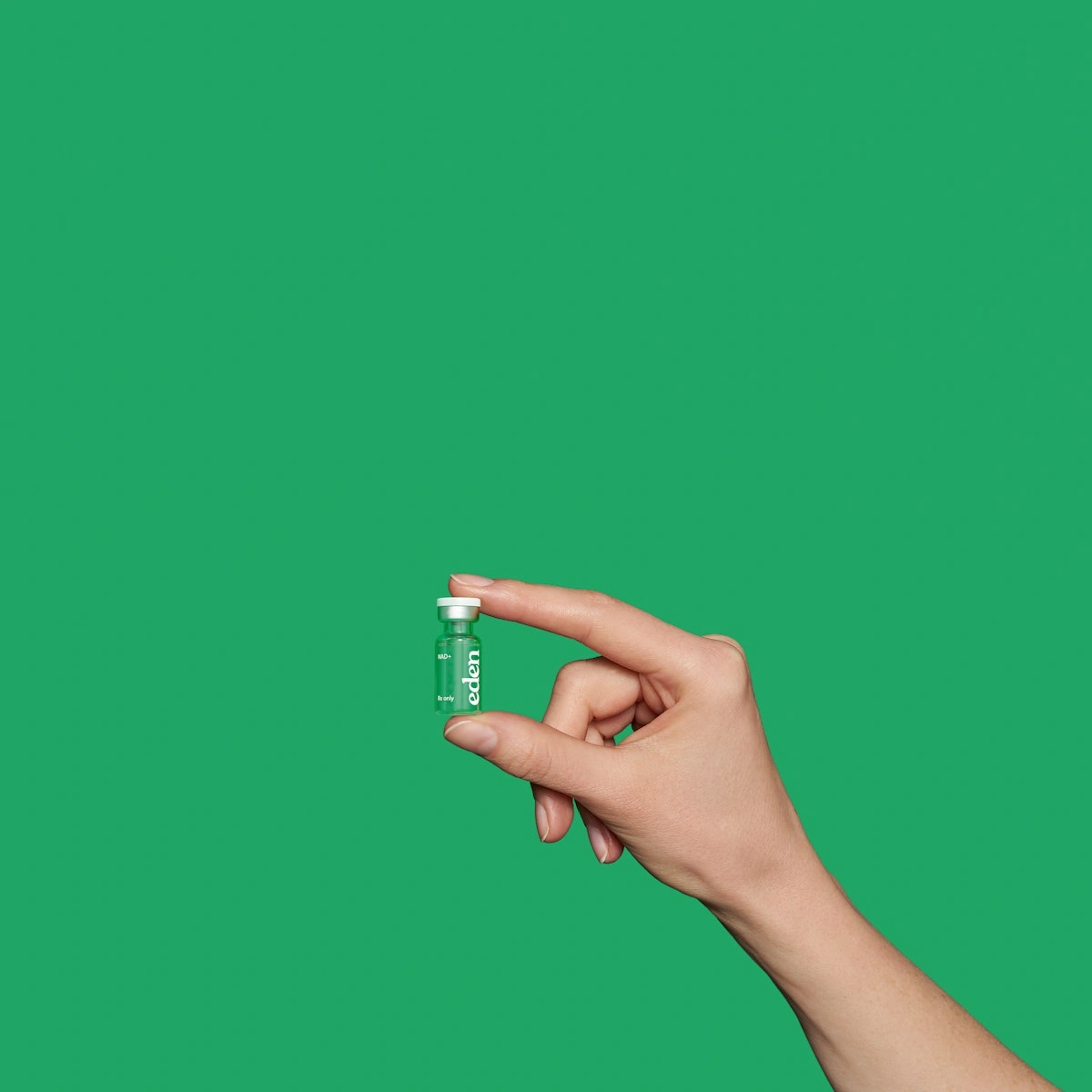NAD+ Injection
Your goals, your plan
Choose the vial size best for you. No hidden fees.
NAD+ (Nicotinamide Adenine Dinucleotide) injections help replenish a vital coenzyme that declines with age—playing a key role in energy metabolism, DNA repair, and cellular resilience. This therapy is designed for those seeking more natural energy, clearer focus, and support for long-term wellness.
NAD+ (nicotinamide adenine dinucleotide) is a naturally occurring coenzyme found in every cell of the body. It plays a role in essential cellular processes like energy metabolism and enzymatic activity. NAD+ levels naturally decline with age, which is why some patients explore NAD+ therapy with their provider as part of their approach to wellness.
Patients may choose to explore NAD+ injections in consultation with a provider as part of a wellness routine. Some individuals seek this therapy for subjective outcomes such as feeling more energized or focused, although experiences vary and NAD+ injections are not FDA-approved for treating any specific condition.
The statements on this page have not been evaluated by the Food and Drug Administration. This product is not intended to diagnose, treat, cure or prevent any disease.
**The FDA does not review or approve any compounded medications for safety or effectiveness.
Feel stronger and age with confidence. On your terms.
The NAD+ program supports cellular energy, sharpens your mind, and helps you age vibrantly.
NAD+ (short for Nicotinamide Adenine Dinucleotide) is a molecule found in every cell of your body. It is essential to cellular energy and repair. NAD+ levels decline naturally as we age, which is why some patients explore replenishing it. That’s where NAD+ therapy comes in.

Rooted in Science
Designed to support how you feel and function.
You may notice real differences in how you think, move, and feel.
Sharper focus & clarity
Brain fog? Meet your new clarity companion.
Restore energy & metabolism
NAD+ boosts mitochondrial function to power your day.
Support healthy aging
Support DNA repair and longevity enzymes like SIRT1.

What the research shows about NAD+
- Supports cellular repair & energy (ATP)
- Activates longevity enzymes like SIRT1
- May support focus, metabolism & skin health
- Administered subcutaneously for high-absorption
Lab tested medications for quality & potency
.webp)
Lab tested for quality & potency
Clean, simple, and effective
- Cruelty
Free - Eco
Friendly - Paraben
Free - Silicone
Free - Sulphate
Free - Gluten
Free
Hit your health goals safely & affordably in 3 simple steps
Submit your application and meet with a doctor
Step 3
Complete a quick form and meet with a licensed medical provider 100% online. They’ll determine if a personalized treatment plan is right for you.

Get your medication delivered at home
Step 3
If eligible, your custom prescription will be shipped directly to your door, fast and free.

Receive 24/7 support and ongoing care
Step 3
We’ll be with you every step of the way, with regular check-ins and on-demand medical support to keep you on track.

Eden helps people discover and then become the ideal version of themselves.
A well-functioning body is key to overall well-being, and access to evidence-based care empowers people to optimize their health and vitality. Eden democratizes access to physician-guided treatments that support people in achieving their health goals, helping them feel and perform at their best.”



Ready to feel like you again?
Discover how NAD+ can support your energy, clarity, and longevity from the inside out. All plans include:
- 1-on-1 guidance from US-based health experts
- No-cost consultations for continuous treatment optimization
- Free expedited 2-day shipping
- Syringes and alcohol wipes
- Patient education materials
- Ongoing support from the Eden team
Individual results may vary. Testimonials reflect personal experiences and do not guarantee outcomes.
NAD+ (nicotinamide adenine dinucleotide) is a naturally occurring coenzyme found in every cell of the body. It plays a role in essential cellular processes like energy metabolism and enzymatic activity. NAD+ levels naturally decline with age, which is why some patients explore NAD+ therapy with their provider as part of their approach to wellness.
Patients may choose to explore NAD+ injections in consultation with a provider as part of a wellness routine. Some individuals seek this therapy for subjective outcomes such as feeling more energized or focused, although experiences vary and NAD+ injections are not FDA-approved for treating any specific condition.
Oral NAD+ supplements have limited and inconsistent absorption. Injectable NAD+ bypasses the digestive system, delivering higher bioavailability and more predictable results under medical supervision.
Side effects are rare but may include mild symptoms such as redness or soreness at the injection site, temporary flushing, fatigue, or headache. Your Eden-connected provider will review your health history and explain what to expect.
NAD+ injections may not be appropriate for individuals who are pregnant, breastfeeding, or managing certain health conditions. That’s why licensed clinicians always conduct a full evaluation before deciding if a prescription is appropriate.
While NAD+ is generally well tolerated, it’s important to review any current medications or supplements with your Eden provider. Your assigned clinician will assess potential interactions and determine if NAD+ is safe and appropriate for your needs.
NAD+ available through Eden's network is compounded by state-licensed pharmacies and is not FDA-approved to treat or prevent any specific condition. Eden does not manufacture or dispense medications but connects patients with licensed providers for consultation and potential treatment options.
All plans include:
- A telehealth visit with a licensed provider
- A personalized prescription, if approved
- NAD+ injections prepared by a state-licensed compounding pharmacy
- Syringes and alcohol swabs
- 2-day shipping directly from the pharmacy
- Access to a care team for ongoing support
Pricing is transparent and includes all components of care—no hidden fees.
You’ll work with licensed, board-certified clinicians who are familiar with wellness-focused approaches to care. They will review your medical history, answer questions, and provide guidance on whether NAD+ is appropriate for you.
Eden partners with state-licensed compounding pharmacies that prepare medications according to your provider’s prescription. Eden does not operate as a pharmacy; all medications are dispensed and shipped directly by the pharmacy in temperature-controlled packaging.
Nope! Your entire experience, from quiz to consult to delivery, happens online. Eden is designed for convenience, so you can access expert care from the comfort of your home.
You may also be interested in
Eden connects patients with licensed providers who may prescribe medication through state-licensed pharmacies. Prescription medication only available if prescribed after an online consultation with a healthcare provider. Physicians may prescribe compounded medications as needed to meet patient requirements or drug shortages. The FDA does not review or approve any compounded medications for safety or effectiveness. Results may vary. Plans are offered as a subscription service which you can cancel at any time. Actual product packaging may appear differently than shown.
NAD+ Injection
- No hidden fees
- Personalized plans
- On-demand medical support
- Free expedited shipping
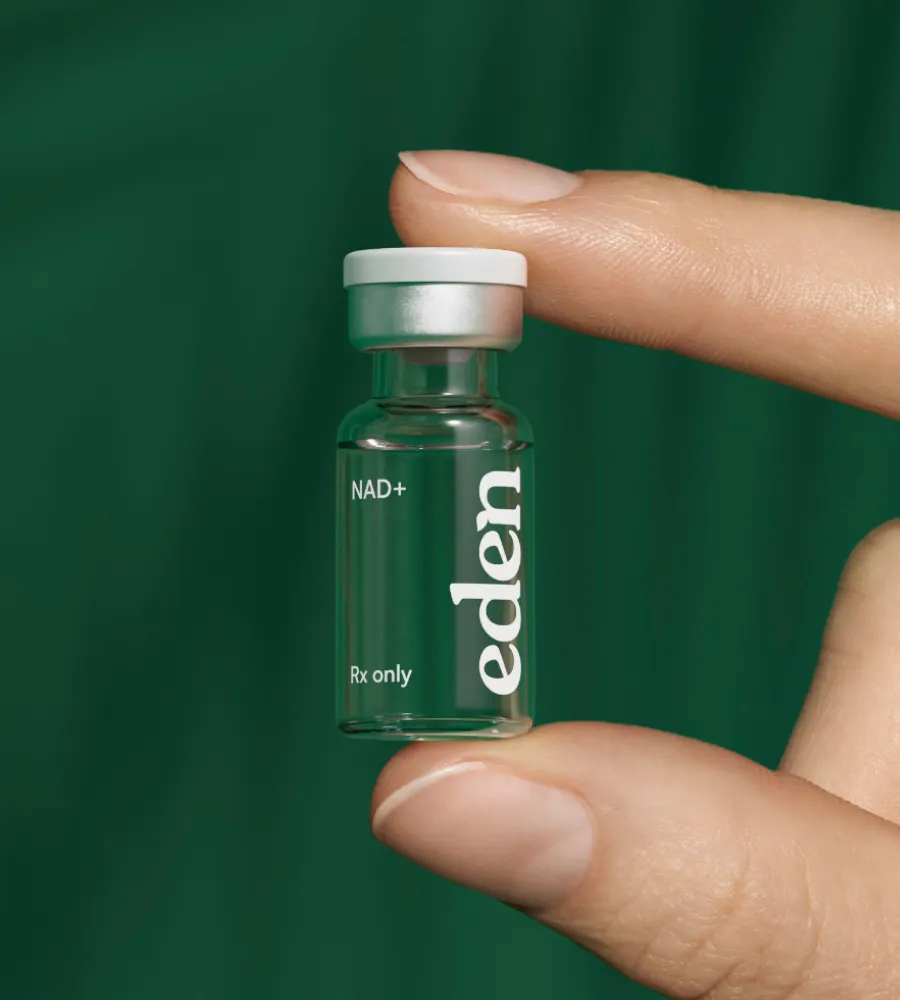
Only available if prescribed after an online consultation with a healthcare provider. Benefits outlined are based on third-party studies. Plans are offered as a subscription service which can be canceled at any time. Actual product packaging may appear differently than shown. Physicians may prescribe compounded medications as needed to meet patient requirements. The FDA does not review or approve any compounded medications for safety or effectiveness. The statements on this page have not been evaluated by the FDA. Results may vary. If you notice any side effects while using this treatment, contact your healthcare provider immediately.
- Antioxidants and Redox Signaling: NAD+/NADH and NADP+/NADPH in Cellular Functions and Cell Death: Regulation and Biological Consequences
- Cell: Declining NAD+ Induces a Pseudohypoxic State Disrupting Nuclear-Mitochondrial Communication during Aging
- Proceedings of the National Academy of Sciences: NAD+ supplementation normalizes key Alzheimer’s features and DNA damage responses in a new AD mouse model with introduced DNA repair deficiency
- Trends in Cell Biology: NAD+ and sirtuins in aging and disease
- Scientific Reports: Nicotinamide Riboside Opposes Type 2 Diabetes and Neuropathy in Mice









